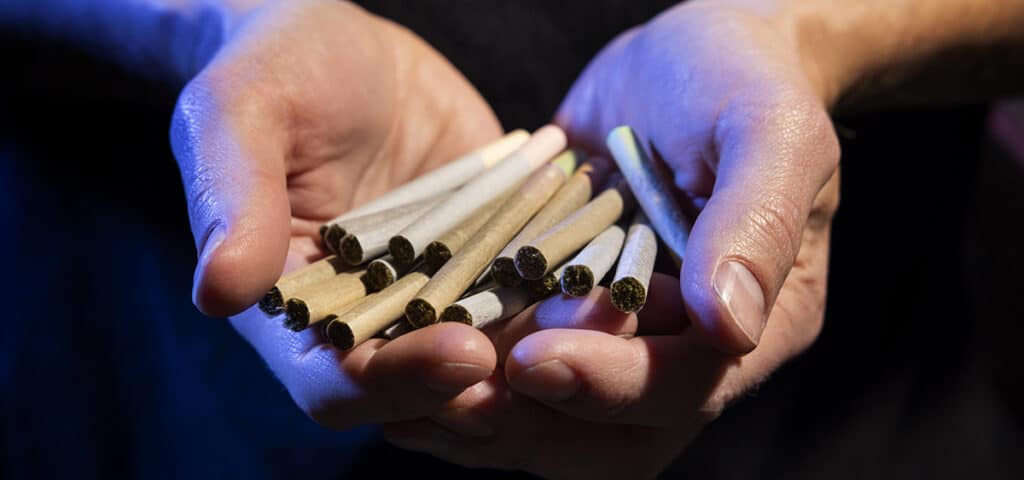New technology and changing consumer demands are suggesting an industry shift from cone-style pre-rolls to straight-cylinder pre-rolls.
Think back to the first time you ever saw a joint being rolled. The key word there is rolled. While pre-made cones have been available for a long time, no cannabis connoisseur that preferred to consume via joints would be caught stuffing a cone. It wasn’t just the ritual of rolling a joint, although for many, this is a near-sacred ritual. And it wasn’t that cones weren’t readily available. It was about performance. A joint rolled by hand in the traditional way simply smoked better than a cone filled from one end. It burned more evenly than a cone which often burns faster down one side or “canoes.” Consumers had more control to make the joint just how they liked it, compacting to their desired density as they rolled it back and forth across their fingers.
Flower prep
Critical to a good joint is the preparation of the flower. When using a cone stuffed or “tamped” from the top, the flower needs to be dryer than any true aficionado would ever want, often down to 5-6% moisture. That problem doesn’t occur when rolling a joint using the traditional method. A consumer can use much stickier, fresher flower, with preferred moisture content in the 10-12% range. That means that hand-rolled joints can smell and taste better because you don’t need to dry and pulverize the flower to the same degree as you would when filling a cone. (Overdrying doesn’t just damage the aroma and taste of the flower, but it actually reduces its efficacy as well. Dried flower retains fewer cannabinoids and terpenes than flower with higher moisture content.)
Consumers had limited choices in the pre-roll category
Ask yourself this: have you ever seen an experienced, self-respecting cannabis enthusiast filling a cone? No. If they love the flower and want to taste and feel its full effect and characteristics, they roll a joint. But that’s the big conundrum for consumers. Not everyone has the time or skill to roll a good joint by hand. Up until 2020, they only had two options: the convenience of a cone-style joint or the better performance and experience of a hand-rolled joint.
RollPros deploys patented technology
In 2020, the pre-roll automation market witnessed the launch of an entirely new technology seeking to produce straight pre-rolls rather than cones. Kyle Loucks — the inventor behind RollPros and a seasoned joint smoker and master roller for 20+ years — wanted to find a way to fix the problems associated with pre-rolls constructed using cones. Loucks wanted to provide consumers with a choice that gave them both convenience and quality, and this is reflected in RollPros’ mantra: “Quality pre-rolls for all!”
The first units of the Blackbird system made their way into the wild at roughly the same time that the Hauni made its category entry. While there were many differences between the two straight joint manufacturing systems, the Blackbird had a new trick that was truly groundbreaking and not borrowed from the tobacco or food industries: it actually rolled joints. Loucks had invented a now-patented technology that applied radial compaction, which is the same way you compact the flower in a hand-rolled joint. Better yet, the Blackbird provided operators with the ability to adjust the amount of tension placed on the joint as it is rolled. This unique feature gave operators complete control over the draw of their joints, something that no other machine on the market can do. For example, when rolling a lighter, fluffier strain, operators can dial up the tension to get the draw just right. Or with a denser, stickier strain, they can reduce the tension. And, as any joint smoker will tell you, one of the most critical characteristics of a good joint and good smoking experience is having just the right draw, or airflow, through the joint.
With the much more accessible price tag of $225k (the cheapest machine in its class), it’s no surprise that the RollPros Blackbird has more than 80 units in the field. Brands from coast to coast have used it to accelerate their success in the pre-roll category, producing true pre-rolls that taste, smell, and sell better. A number of top-selling brands, like Rebel Spirit in Oregon and Joints in Oklahoma, have built their entire business around the Blackbird.
Why do cones still dominate?
So why are cones still so dominant in the pre-roll category? According to RollPros COO Nick Buck, it’s just time. “In the legal cannabis industry, cones have been the norm for years. That’s what people expect; it’s what they are used to. So when you throw something new their way, it takes time for consumers to give in and try it. But once they do smoke a well-crafted rolled joint made with a Blackbird, very few ever go back to cones,” says Buck. “They provide the consumer the experience they’ve always wanted from a pre-roll, but have never been able to get. They had to settle for cones, but they don’t have to anymore!”
Pre-Roll preferences are changing
Slowly but surely, consumer preferences are changing. While Rebel Spirit was growing their brand, they didn’t switch entirely to the Blackbird right away and continued to produce cone offerings. But the balance between the two options continues to shift, and as their brand reaches new heights (currently, they are the best-selling pre-roll brand in Oregon), their sales of Blackbird-manufactured joints continue to grow while the cone-style joints stagnate and decline. “Demand for our rollies, as we call them, quickly outpaced our capacity. So six months after our first Blackbird unit kicked off, we purchased a second one. And we still feel like we haven’t hit our full potential,” says Rebel Spirit COO Chris Belcher. That’s significant in what many see as the U.S.’s most challenging cannabis market.
Straight is the future!
Straight-rolled joints are simply the automated version of what has always provided cannabis enthusiasts with the best smoking experience. When the first consumer cars were invented, eventually everyone switched from horse-drawn carriages — but it happened gradually, and now we can observe the pre-roll category go through the same transition.

